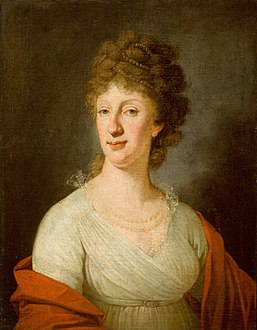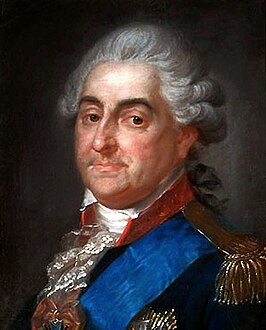Józef Pitschmann: Difference between revisions
New article, adapted from Polish Wikipedia |
Moving from Category:Painters from the Holy Roman Empire to Category:18th-century Austrian painters Diffusing per WP:DIFFUSE and/or WP:ALLINCLUDED using Cat-a-lot |
||
| (36 intermediate revisions by 16 users not shown) | |||
| Line 1: | Line 1: | ||
{{Short description|Austrian-born Polish portrait painter}} |
|||
[[File:Józef Pitschmann.jpg|thumb|185px|Józef Pitschmann; portrait by [[Jan Feliks Piwarski]].]] |
[[File:Józef Pitschmann.jpg|thumb|185px|Józef Pitschmann; portrait by [[Jan Feliks Piwarski]].]] |
||
'''Józef Franciszek Jan Pitschmann''', or '''Franz Joseph Pitschmann''' (1758 |
'''Józef Franciszek Jan Pitschmann''', or '''Franz Joseph Pitschmann''' (1758 in [[Trieste]] – 1 September 1834 in [[Krzemieniec]]) was an Austrian-born Polish portrait painter. |
||
== Biography == |
== Biography == |
||
He began his artistic studies at the [[Academy of Fine Arts, Vienna]], under the direction of Heinrich Carl Brandt |
He began his artistic studies at the [[Academy of Fine Arts, Vienna]], under the direction of [[Heinrich Carl Brandt]], a noted portrait painter.<ref name="S">[http://sztuka.zaprasza.net/naz/pitsh/default.htm Biographical notes] @ Sztuka Zaprasza.</ref> In 1787, he was awarded a gold medal for his depiction of [[Hercules]] returning [[Admetus]] to [[Alcestis]], and was made a member of the Academy.<ref name="I">[http://sztuka.zaprasza.net/naz/pitsh/default.htm Brief biography] @ Internetowy Polski Słownik Biograficzny.</ref> |
||
In 1788, he moved to Poland at the invitation of [[Józef Klemens Czartoryski]], living in his home in [[Korzec]] while working as a portrait painter and art teacher.<ref name="S" /> From 1789 to 1794, he lived in [[Warsaw]] where he painted for the nobility and the bourgeoisie; notably several portraits of King [[Stanisław II August]], for which he was awarded a diamond ring.<ref name="I" /> In 1794, he moved to [[Lwów]], where he lived until 1806. While there, he is known to have produced over 300 portraits, including one of Emperor [[Francis II, Holy Roman Emperor|Francis I]] and his wife. |
In 1788, he moved to Poland at the invitation of [[Józef Klemens Czartoryski]], living in his home in [[Korzec]] while working as a portrait painter and art teacher.<ref name="S" /> From 1789 to 1794, he lived in [[Warsaw]] where he painted for the nobility and the bourgeoisie; notably several portraits of King [[Stanisław II August]], for which he was awarded a diamond ring.<ref name="I" /> In 1794, he moved to [[Lwów]], where he lived until 1806. While there, he is known to have produced over 300 portraits, including one of Emperor [[Francis II, Holy Roman Emperor|Francis I]] and his wife. |
||
In 1806, [[Tadeusz Czacki]] offered him a position at the new [[Krzemieniec Lyceum]], where he became a drawing teacher. He also |
In 1806, [[Tadeusz Czacki]] offered him a position at the new [[Krzemieniec Lyceum]], where he became a drawing teacher. He also gave private lessons.<ref name="S" /> During this time, he created an additional 150 portraits, mostly of the professors at the school and the local nobility, and received several awards from the Emperor.<ref name="I" /> His best-known student was [[Jan Ksawery Kaniewski]]. |
||
After his retirement, he remained in Krzemieniec and died there. |
After his retirement, he remained in Krzemieniec and died there. |
||
==Selected portraits== |
==Selected portraits== |
||
<gallery mode=packed heights="220"> |
|||
File:Józef Franciszek Jan Pitschmann, Portret Tadeusza Czackiego.jpg| |
File:Józef Franciszek Jan Pitschmann, Portret Tadeusza Czackiego.jpg|Tadeusz Czacki |
||
File:Pitschmann - Maria Teresa.jpg|[[Maria Theresa of Austria (1767–1827)|Maria Theresa of Austria]] |
File:Pitschmann - Maria Teresa.jpg|[[Maria Theresa of Austria (1767–1827)|Maria Theresa of Austria]] |
||
File:Teresa Stadnicka - Pitschmann.jpg| |
File:Teresa Stadnicka - Pitschmann.jpg|{{ill|Teresa Stadnicka|pl}} |
||
File:Pitschmann Stanislaus Augustus.jpg|Pastel of King< |
File:Pitschmann Stanislaus Augustus.jpg|Pastel of King<br /> Stanisław II August |
||
</gallery |
</gallery> |
||
==References== |
==References== |
||
| Line 22: | Line 23: | ||
==External links== |
==External links== |
||
{{ |
{{commons category|Franz Joseph Pitschmann|Józef Pitschmann}} |
||
*[http://www.pastellists.com/articles/pitschmann.pdf Józef Pitschmann] from Neil Jeffares, ''Dictionary of Pastellists''. |
*[http://www.pastellists.com/articles/pitschmann.pdf Józef Pitschmann] from Neil Jeffares, ''Dictionary of Pastellists''. |
||
{{Authority control}} |
{{Authority control}} |
||
{{DEFAULTSORT:Pitschmann, Jozef}} |
{{DEFAULTSORT:Pitschmann, Jozef}} |
||
[[Category:1758 births]] |
|||
[[Category:1834 deaths]] |
|||
[[Category:19th-century Polish painters]] |
|||
[[Category:19th-century Polish male artists]] |
|||
[[Category:18th-century Polish–Lithuanian painters]] |
|||
[[Category:18th-century Austrian male artists]] |
|||
[[Category:Polish portrait painters]] |
|||
[[Category:Emigrants from the Holy Roman Empire]] |
|||
[[Category:Artists from Trieste]] |
|||
[[Category:Polish male painters]] |
|||
[[Category:18th-century Austrian painters]] |
|||
[[Category:Immigrants to the Polish–Lithuanian Commonwealth]] |
|||
Latest revision as of 16:41, 31 August 2024

Józef Franciszek Jan Pitschmann, or Franz Joseph Pitschmann (1758 in Trieste – 1 September 1834 in Krzemieniec) was an Austrian-born Polish portrait painter.
Biography
[edit]He began his artistic studies at the Academy of Fine Arts, Vienna, under the direction of Heinrich Carl Brandt, a noted portrait painter.[1] In 1787, he was awarded a gold medal for his depiction of Hercules returning Admetus to Alcestis, and was made a member of the Academy.[2]
In 1788, he moved to Poland at the invitation of Józef Klemens Czartoryski, living in his home in Korzec while working as a portrait painter and art teacher.[1] From 1789 to 1794, he lived in Warsaw where he painted for the nobility and the bourgeoisie; notably several portraits of King Stanisław II August, for which he was awarded a diamond ring.[2] In 1794, he moved to Lwów, where he lived until 1806. While there, he is known to have produced over 300 portraits, including one of Emperor Francis I and his wife.
In 1806, Tadeusz Czacki offered him a position at the new Krzemieniec Lyceum, where he became a drawing teacher. He also gave private lessons.[1] During this time, he created an additional 150 portraits, mostly of the professors at the school and the local nobility, and received several awards from the Emperor.[2] His best-known student was Jan Ksawery Kaniewski. After his retirement, he remained in Krzemieniec and died there.
Selected portraits
[edit]-
Tadeusz Czacki
-
Pastel of King
Stanisław II August
References
[edit]- ^ a b c Biographical notes @ Sztuka Zaprasza.
- ^ a b c Brief biography @ Internetowy Polski Słownik Biograficzny.
External links
[edit]- Józef Pitschmann from Neil Jeffares, Dictionary of Pastellists.
- 1758 births
- 1834 deaths
- 19th-century Polish painters
- 19th-century Polish male artists
- 18th-century Polish–Lithuanian painters
- 18th-century Austrian male artists
- Polish portrait painters
- Emigrants from the Holy Roman Empire
- Artists from Trieste
- Polish male painters
- 18th-century Austrian painters
- Immigrants to the Polish–Lithuanian Commonwealth



![Teresa Stadnicka [pl]](/upwiki/wikipedia/commons/thumb/6/63/Teresa_Stadnicka_-_Pitschmann.jpg/228px-Teresa_Stadnicka_-_Pitschmann.jpg)
